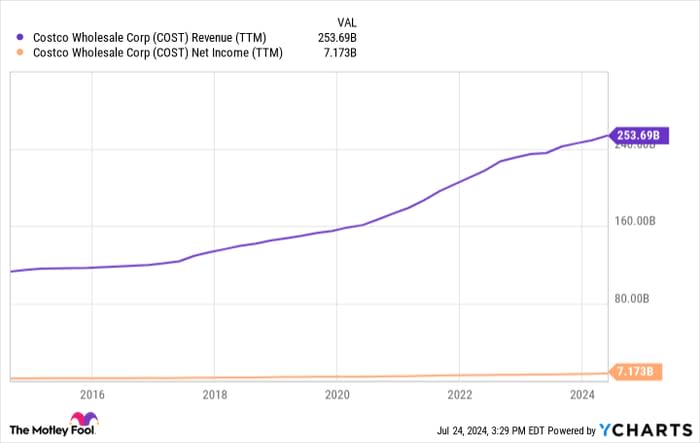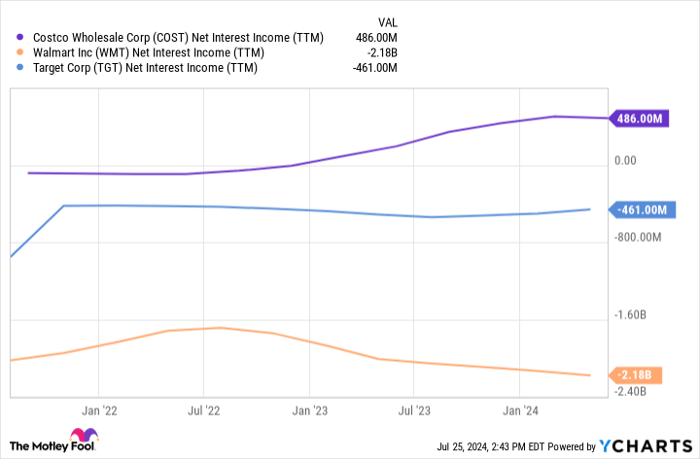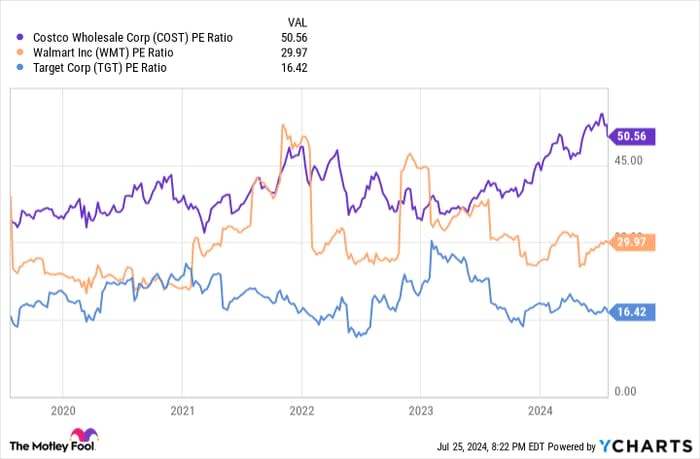Costco Stock: Buy, Sell, or Hold?
Costco Wholesale (NASDAQ: COST) members in the U.S. and Canada will soon pay more for their memberships after the company recently announced a price hike. The news comes on the heels of an outstanding 2024 for the stock, which is up approximately 25% year to date.
Given the rise in Costco stock, it's worth digging into its recent financials, the details of the price hike, and its valuation to determine whether it's a buy, sell, or hold.
Costco is setting new records
Over the trailing 12 months, the membership-only retailer generated $253.7 billion in revenue and $7.2 billion in net income, representing year-over-year growth of 4.7% and 14%, respectively. Both represent record highs for any 12-month period in Costco's history. Additionally, it reached $74.5 million in memberships in its most recently reported quarter, representing a year-over-year increase of 7.8%.
COST Revenue (TTM) data by YCharts.
With Costco's steady revenue and net income growth, the company has become a reliable dividend-paying stock. It currently pays a quarterly dividend of $1.16 per share, equating to a modest 0.56% annual yield. The company is also known for paying special cash dividends, with five over the past 11 years and the last in January 2024 at $15 per share.
Costco can comfortably pay quarterly and special cash dividends because of its envious balance sheet. As of its fiscal 2024 third quarter, the company had $4.6 billion in net cash. This represents a stark contrast to competitors Target (NYSE: TGT) and Walmart (NYSE: WMT), which had $12.5 billion and $38.9 billion in net debt, respectively.
With its cash hoard, Costco shareholders can anticipate the company increasing its quarterly dividend annually, as it has done for the past 19 consecutive years.
Moreover, while competitors grapple with rising interest expenses due to elevated rates, Costco benefits by earning income from its cash position. For example, over the trailing 12 months, Target and Walmart incurred $461 million and $2.2 billion in interest expenses, respectively, whereas Costco generated $486 million in interest income.
COST Net Interest Income (TTM) data by YCharts.
Costco is raising its membership prices
Recently, Costco announced that starting Sept. 1, 2024, it will increase annual membership fees in the U.S. and Canada by $5 for standard memberships (raising the annual fee from $60 to $65), and $10 for Executive members (raising the annual fee from $120 to $130). The rate increase is expected to affect 52 million Costco members, with "a little over half" being Executive memberships.
Given that price increase, Costco can expect a windfall of approximately $400 million to its high-margin membership revenue. For context, Costco generated $4.8 billion in membership fees over the trailing 12 months, so this price hike will result in a roughly 12% boost even without accounting for new memberships.
Costco always trades for a high valuation
The late Charlie Munger, the former vice chairman of Berkshire Hathaway and longtime Costco board member, once described Costco as a "perfect" company with only one flaw: Its steep valuation. Using the common valuation metric for mature companies -- the price-to-earnings (P/E) ratio -- Costco trades at 50.6 times earnings.
An investor can better understand a company's valuation by comparing its P/E ratio to its competitors' and its historical averages. For instance, Target and Walmart have P/E ratios of 16.4 and 30, respectively. Costco's median P/E ratio over the past five years is 38.9, suggesting that the stock is currently valued higher than usual.
COST PE Ratio data by YCharts.
Notably, that indicator looks back at the previous 12 months, so the membership price hike isn't taken into consideration. Neither is Costco's next growth avenue: International expansion. As of early July, Costco has 882 locations, with 81% in the United States and Canada. Its most notable growth opportunity comes in China, a relatively new market for the company, where it only has seven warehouses for a population of over 1.4 billion people.
What should I do with my Costco stock?
Costco remains one of the best-managed companies available on the public markets, which explains its high stock valuation. Returning to Charlie Munger's thoughts on the company, he wasn't deterred from Costco's consistently high valuation -- he pledged that he would never sell a share during his lifetime.
Current shareholders would be wise to heed Munger's advice. Even if the stock falls to a more historical valuation, you can rest easy knowing Costco's growth opportunities, all while collecting a growing dividend.
Prospective investors concerned about the valuation might want to consider adding the stock to their watchlist and waiting for a potential dip. Alternatively, they can employ a dollar-cost averaging strategy, gradually purchasing shares over time to accumulate a position at varying price points.
Should you invest $1,000 in Costco Wholesale right now?
Before you buy stock in Costco Wholesale, consider this:
The Motley Fool Stock Advisor analyst team just identified what they believe are the 10 best stocks for investors to buy now… and Costco Wholesale wasn’t one of them. The 10 stocks that made the cut could produce monster returns in the coming years.
Consider when Nvidia made this list on April 15, 2005... if you invested $1,000 at the time of our recommendation, you’d have $692,784!*
Stock Advisor provides investors with an easy-to-follow blueprint for success, including guidance on building a portfolio, regular updates from analysts, and two new stock picks each month. The Stock Advisor service has more than quadrupled the return of S&P 500 since 2002*.
*Stock Advisor returns as of July 29, 2024
Collin Brantmeyer has positions in Berkshire Hathaway, Costco Wholesale, and Target. The Motley Fool has positions in and recommends Berkshire Hathaway, Costco Wholesale, Target, and Walmart. The Motley Fool has a disclosure policy.



